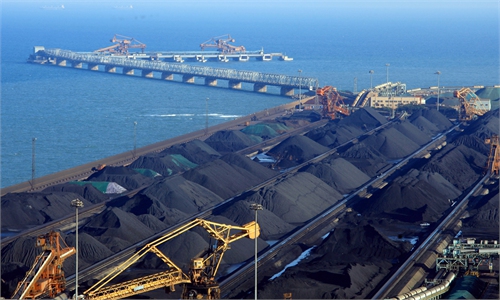
A coal mine in Ejin Horo Banner, North China's Inner Mongolia Autonomous Region on October 20, 2021 Photo: VCG
Domestic coal futures had plunged for three consecutive trading days after the government vowed to crack down on soaring prices, and China's top economic planner sent an even harsher message on Friday, saying it will severely punish violations of price rules.
The National Development and Reform Commission (NDRC) said at the meeting, attended by some key coal companies, that they should set prices reasonably, and severe penalties will be imposed for those who engage in profiteering.
NDRC said that it will assign several investigation teams to major coal provinces for on-site investigations on the cost of production and circulation, as well as the profits, to provide a reference for the reasonable range of coal prices.
The most-traded thermal coal futures contract dropped to its daily limit for the third day in a row on Friday. As of press time, the price was 1,365 yuan ($213) per ton, which is more than 30 percent lower than the record price of 1,982 yuan per ton on Tuesday.
"The price is down now, but still high, and a price above 1,000 yuan can be regarded as high," Han Xiaoping, chief analyst at energy industry website china5e.com, told the Global Times on Friday.
Supply is not a big issue, for coal mines such as in North China's Inner Mongolia Autonomous Region have many open-pit coal mines, which can quickly produce. But speculation is behind soaring prices, and that is the target for the government crackdown, Han said. He added that last year, the futures price was 500 yuan per ton for a while.
China's top economic planner on Friday required the local government of Yulin, Northwest China's Shaanxi Province to investigate price hike rumors which claimed that some mines had suspended production.
Market insiders said coal prices will turn around because different departments are taking measures to curb the prices, and major provinces with abundant sources are considering increasing supplies.
The impact on the coal market of such policies would continue over the short term, according to Ruida Futures. The start of peak-demand winter months for thermal coal consumption will still underpin coal prices, while a gradual increase in coal production, especially amid the ongoing push to maintain supplies, suggests coal prices will return to normal, Ruida Futures said.
Data from the energy bureau of Inner Mongolia showed that since September, its coal production has increased significantly, with average daily coal production exceeding 2.8 million tons, an increase of about 300,000 tons over the previous two months. In early October, coal production further increased, reaching 3 million tons a day, and the annual output is expected to reach at least 1.05 billion tons.
Four leading coal producers, state-owned CHN Energy, China National Coal Group Corporation, Jinneng Holding Group, and private-owned Inner Mongolia Yitai Group Company, on Thursday openly pledged to strictly observe a price ceiling for thermal coal and ensure coal supplies.
However, such measures have not capped spot coal prices, an anonymous insider from a power generation enterprise told the Global Times on Friday, saying that the supply and demand gap is too wide. Nevertheless, there is also less clean energy power this year.
Feng Libing, the general manager of Anyi Coal Mine Company in Jiexiu, North China's Shanxi Province, told the Global Times on Friday that buyers are still seeking coal, and supply remains tight. "It may take time for the market to ease," he said.



